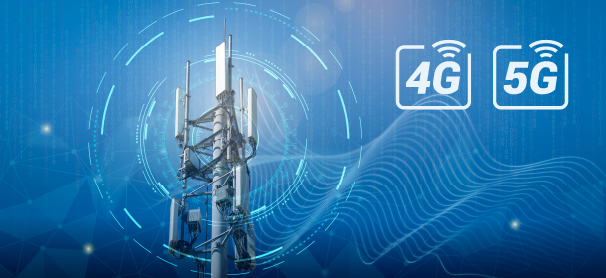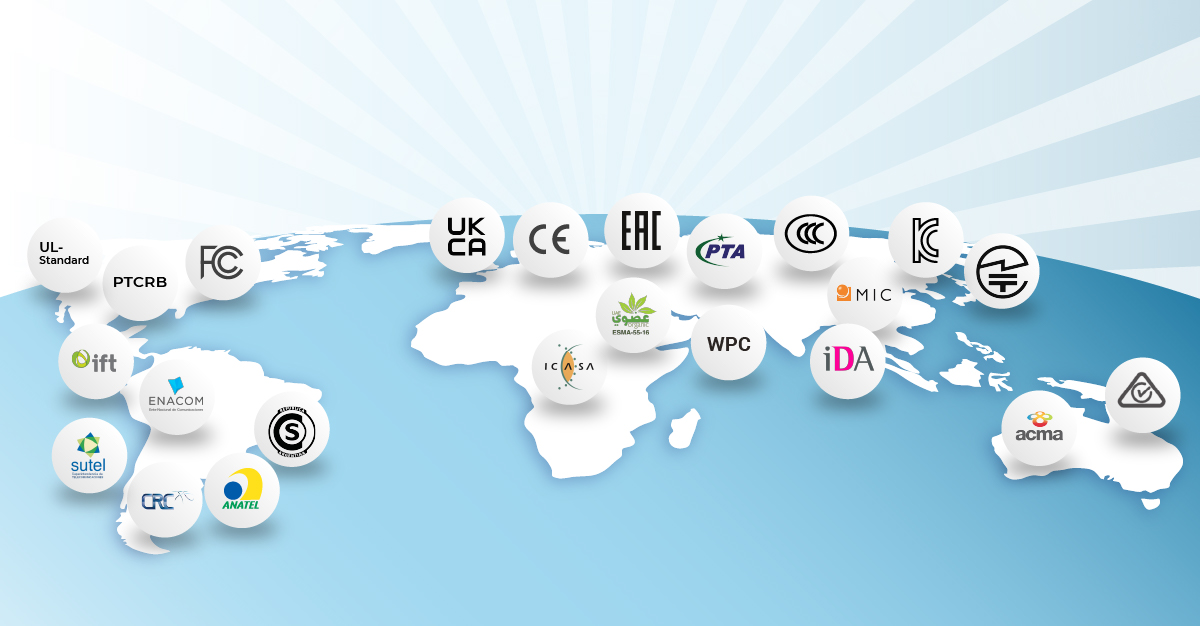LTE certification is crucial for any wireless device to access global markets. But navigating the complex landscape of testing, regulations, and approvals can be daunting. That’s where 360Compliance steps in, offering a streamlined, one-stop solution for all your LTE device testing needs.
Smartphones are used by a great proportion of mobile users worldwide. Considering the growing demand for better performance and application-specific requirements during the last decade, the evolution occurred in this market. This was made possible by a vision of important parties collaborating, as well as a lot of research and hard work over the years. The collaboration resulted in the development of LTE technology to fulfill customers’ internet needs.
Although some LTE use cases have been implemented, there are still issues that need to be resolved in terms of performance, delay, and spectrum efficiency for operational maintenance. 4G technology, based entirely on IP, allows for seamless connectivity and worldwide roaming. Compatibility using current wireless protocols, easy handovers, and great service quality are all features of this technology.
What is LTE Certification?
LTE (Long-Term Evolution) certification ensures that wireless devices comply with industry standards for performance and compatibility. Obtaining LTE certification is essential for manufacturers looking to enter global markets and ensure their products meet regulatory requirements.
What Is The Purpose Of LTE Certification?
4G Testing verifies that your device or equipment complies with the stringent technical specifications and regulatory requirements of Long-Term Evolution (LTE) networks. This comprehensive evaluation ensures:
- Compatibility: Your device can seamlessly connect and operate across different LTE networks worldwide.
- Performance: You deliver the expected high-speed data transfer, low latency, and reliable voice communication.
- Safety: Your device adheres to established safety standards, protecting users and infrastructure.
Why LTE Device Certification Matters:
- Market Access: Certification is your gateway to selling in numerous countries, ensuring compliance with regional regulations.
- Consumer Confidence: Certification signifies quality, safety, and performance, boosting consumer trust and brand reputation.
- Interoperability: Certification guarantees seamless device interaction with various networks, enhancing user experience.
Why Choose 360Compliance For LTE Testing?
360Compliance offers comprehensive solutions, from pre-compliance guidance to final certification, ensuring a smooth and efficient process. Leverage our:
- Extensive experience: Our seasoned team guides you through every step, addressing challenges and optimizing your certification timeframe.
- Global reach: Access our network of accredited labs strategically positioned worldwide, minimizing travel and logistical hurdles.
- Cost-effective solutions: Benefit from transparent pricing and fixed costs, allowing you to budget effectively.
- Technical expertise: Our qualified engineers conduct rigorous testing with cutting-edge equipment, ensuring compliance and optimal performance.
Contact 360ComplianceTesting Labs today and discuss your specific LTE certification and testing requirements. Our team will guide you through the process, ensuring you achieve fast, efficient, and cost-effective compliance for your LTE devices.
Other Certifications

5G Testing and Certification
Are you developing innovative products that rely on cutting-edge wireless connectivity? 5G technology is crucial for enabling self-driving cars, the Internet of Things (IoT), VR/AR, and more, offering numerous advantages over 4G, including faster data transfer, higher download speeds, and increased capacity. To fully leverage the revolutionary potential of 5G, ensuring compliance through rigorous testing and certification is essential. 360Compliance provides comprehensive 5G device testing services, ensuring your products meet international, regional, and national standards, facilitating a smooth market entry and contributing to the advancement of technology across various industries. What is 5G? New innovative products and technologies such as self-driving cars, the Internet of Things (IoT), VR/AP, etc. require better wireless connectivity. 5G technology makes them a reality because this generation of mobile communication has many advantages over 4G: More stable connection and transfer of data; The higher download speed that is almost 100 times faster than 4g and reaches several Gbps; Increased capacity for a single bandwidth that ensures the connection of more equipment and devices simultaneously This wireless technology allows you to accelerate automation processes, implement AI in workflows, create intelligent factories, and more. Why is 5G Compliance Testing Essential for Your Business? The impact of the 5th generation mobile network on the economy and communication will be more revolutionary than any previous generation of mobile communications. Although new devices based on this technology already provide tangible benefits, the potential of this communication type will be fully revealed in the next decade. At the same time, their offer on the global market requires testing 5G and certification confirming compliance with the current international, regional, and national regulations. Market Requirements For the 5th generation mobile ecosystem to become a reality, more work needs to be done at the level of governmental agencies. Additional frequency bands are required to ensure uninterrupted network operation. Currently, high-speed broadband access is proposed through the use of mmWave technology. These radio waves include the 24 GHz ‒ 100 GHz spectrum. However, using such technology has some challenges. Proximity to the transmitter tower is necessary as the signal can be easily blocked. 5G Wireless Testing and Certification If you want to provide goods or services in any segment of the economy based on this revolutionary technology, you need to pass 5G testing and certification. Wireless devices must undergo evaluation to ensure their safety and environmental neutrality for the people using them. Obtaining a certificate confirming compliance with international standards will make it easier and hassle-free to transport your products to the global market. To pass 5G tests, you need to evaluate your products according to the following indicators: Radiofrequency (RF) Electromagnetic compatibility (EMC) Specific absorption rate (SAR) Quality of service (QoS), and others Industries The wide opportunities provided by 5G contribute to the introduction of innovations in all spheres of human life. In particular, among the leaders in the use of Fifth-generation wireless products are the following industries: Medicine Automotive Urban planning Enterprises VR/AR Industry Household appliances IoT products, and many others Why Choose 360Compliance for 5G Device Testing? 5G compliance testing requires verification of compliance not only with international but also with national standards. 360Compliance team has extensive experience in certifying wired and wireless radio electronic devices for markets in over 195 countries. In addition, we have all permits and licenses for the full cycle certification — from the acceptance and consideration of applications to the examination and issuance of certificates. We will evaluate your products through our network of laboratories. Therefore, when you turn to us for a 5G test, you get a fast, professional, and comprehensive service that will save you from unnecessary fuss and red tape. As technology enthusiasts, we strive to ease the way to consumers for products that accelerate progress and empower humanity such as 5th generation-enabled devices. Call us to start your journey to the market!
Learn more
FirstNet Testing
Have you ever wondered how your telecommunication devices can meet the critical communication needs of first responders? Achieving FirstNet certification is vital to ensuring your devices are reliable, secure, and capable of operating on the First Responder Network Authority (FirstNet) network. But how do you navigate the complexities of this certification process? That’s where 360Compliance comes in. Our expert team simplifies the journey, providing comprehensive services to help you quickly achieve FirstNet certification. From rigorous lab and field testing to stringent security validations, 360Compliance ensures your devices meet all necessary standards, making the certification process faster, easier, and more cost-effective. What is FirstNet Certification? FirstNet certification refers to obtaining approval and recognition for telecommunication devices, applications, and services to operate on the First Responder Network Authority (FirstNet) network. FirstNet is a dedicated and secure wireless broadband network designed to meet the unique communication needs of first responders in the United States. Types of FirstNet Device Certification There are three main types of FirstNet certification, each catering to different needs: FirstNet Ready: These devices work seamlessly on the FirstNet network with an AT&T SIM card, offering HPA and Band 14. Examples include smartphones, tablets, and laptops. FirstNet Trusted: Designed for Internet of Things (IoT) devices like sensors and cameras, these devices undergo additional security testing and meet stringent cybersecurity standards. FirstNet Capable: These devices may require additional configuration or unlocking to access FirstNet features, including HPA and Band 14. How to Obtain FirstNet Certification? The process for obtaining FirstNet certification varies depending on the type of device. Here's a general overview: Device compatibility: Ensure your device meets the technical specifications and functionalities required for FirstNet. Lab testing: Submit your device for rigorous testing at an authorized AT&T facility. This tests performance, security, and network compatibility. Field testing: Conduct field tests with a third-party provider to validate real-world performance and functionality. Security validation: Meet stringent security requirements to protect sensitive data and prevent cyberattacks. Mission-critical application testing: Ensure compatibility with specific mission-critical applications used by first responders. Certification: Once all tests and validations are successful, your device will receive the appropriate FirstNet designation (Ready, Trusted, or Capable). What Devices Support FirstNet? A robust and growing list of devices holds the coveted FirstNet badge, encompassing smartphones, tablets, laptops, wearables, and even Internet of Things (IoT) equipment. You can find a comprehensive list on the FirstNet website. Benefits of Using Certified Devices Using FirstNet-certified devices offers several advantages for first responders: Certified devices undergo rigorous testing to ensure flawless performance on the FirstNet network, even under extreme conditions. This means first responders can count on their equipment when it matters most. Enhanced Security: FirstNet Trusted devices provide extra protection for sensitive data, keeping critical information safe from unauthorized access. Priority Access: Certified devices benefit from HPA, ensuring their data gets prioritized over civilian traffic during emergencies. This can be crucial for coordinating response efforts and saving lives. Are AT&T and FirstNet the Same? While AT&T operates the FirstNet network, they are distinct entities. FirstNet is an independent authority governed by the First Responder Network Authority, a federal agency responsible for overseeing the network's development and deployment. AT&T provides the infrastructure and services but ultimately serves as a contractor for FirstNet Authority. Why Choose 360Compliance For FirstNet Device Certification? To ensure your devices are compatible with the critical FirstNet network, you need a partner who understands the complexities and can navigate the process seamlessly. That's where 360Compliance comes in. We offer a comprehensive package of services that takes the hassle out of FirstNet device certification, making it faster, easier, and more cost-effective. Choosing 360Compliance for FirstNet device certification offers a comprehensive and streamlined solution for regulatory approvals. Contact 360Compliance for expert guidance and support.
Learn more
Cellular Testing
Key Components of Cellular Testing Interoperability: Cellular testing ensures that mobile devices can seamlessly connect and communicate with various networks and infrastructure. This is vital for users who may switch between different carriers or travel internationally, as their devices need to function reliably across diverse network environments. Compliance with Standards: Cellular technologies adhere to established standards set by organizations such as the International Telecommunication Union (ITU), 3rd Generation Partnership Project (3GPP), and Global Certification Forum (GCF). Certification ensures that devices comply with these standards, promoting consistency and compatibility across the industry. Network Compatibility: Certification ensures that mobile devices are compatible with specific generations of cellular networks, such as 2G (GSM), 3G (UMTS), 4G (LTE), and the latest 5G technologies. This compatibility is essential for optimal performance and takes into account factors like data speed, latency, and network efficiency. A Step-by-Step Guide to Cellular Certification The cellular certification process is a comprehensive evaluation that mobile devices undergo to ensure compliance with industry standards and regulations. The process includes: Pre-Certification Assessment: Manufacturers begin the process by conducting an internal evaluation of the device's hardware, software, and overall design to identify potential issues. Submission of Documentation: Manufacturers must compile and submit detailed documentation outlining the device's specifications, features, and technical aspects. This documentation typically includes information about the device's hardware components, software architecture, security features, and network compatibility. Laboratory Testing: Rigorous testing for network compatibility, data transmission, voice quality, multimedia performance, and security features. Network Simulation: Devices undergo testing in simulated network environments to evaluate their performance under various network conditions, such as low signal strength or high network traffic. Interoperability Testing: Evaluation of device compatibility with various networks, applications, and services. Security and Compliance Checks: The certification process includes a thorough examination of the device's security features to ensure compliance with industry standards and regulations. Regulatory compliance checks, including safety standards and electromagnetic compatibility, are conducted to meet legal and environmental requirements. Certification Issuance: Awarding of certification upon successful completion of all tests. Post-Certification Support: Manufacturers may need to provide ongoing support, addressing any issues that may arise after certification. This stage involves collaborating with regulatory bodies and network operators to address updates, patches, or new standards that may impact the certified device. Benefits of Cellular Certification Cellular mobile device certification offers a multitude of benefits for both manufacturers and users: Guaranteed Compatibility: Devices that are certified work seamlessly with the network, ensuring reliable and consistent connectivity. Improved User Experience: Users benefit from better call quality, faster data speeds, and a more stable overall mobile experience. Reduced Costs: Manufacturers can save time and money by ensuring their devices are certified before launch, avoiding costly rework or delays. Enhanced Safety: Cellular phone certification ensures devices comply with safety regulations, protecting users and the network infrastructure. Why Choose 360Compliance for Your Cellular Testing Needs? When it comes to cellular testing, 360Compliance stands out as your trusted partner. Our team brings extensive experience in certifying electronic devices for markets spanning over 195 countries. With all the necessary permits and licenses for end-to-end certification, we offer fixed costs from start to certificate, ensuring transparency in pricing. Connect with 360Compliance experts for an initial, free-of-charge consultation, guiding you towards the right strategic approach for a faster time-to-market and a cost-effective solution. Additional Resources: IoT Cellular Certification: Read more Cellular Carrier Certification: Read more CTIA Certification: Read more
Learn more

